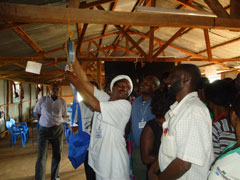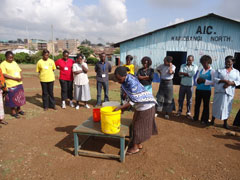- Home
- Technical Cooperation Projects
- Index of Countries
- Africa
- Kenya
- Project for Strengthening Community Health Strategy
- Project News
- JICA CHS Project Support for Capacity Development: Community Health Worker (CHW) Training Manual Revision
Project News
2013-05-30
JICA CHS Project Support for Capacity Development: Community Health Worker (CHW) Training Manual Revision
Since 2012, the Project has been working on revision of Community Health Worker (CHW) training manual together with the Division of Community Health Services and other partners. This manual will be used by Community Health Extension Worker (CHEW), to train CHWs who are aware of the community's needs, and thus play crucial roles of building a bridge between the community and health service.
The revision aims of making the CHW training manual more user friendly by simplifying the language, use of participatory methods and local known examples and situations.
In order to have the community centered mind-set, the Project organized a workshop called the community centered approach attended by the Technical Working Group (TWG) members.
Following this workshop, the TWG had several meetings/retreats to review, revise as well as build consensus to have a draft ready for pretesting. Thus involved all divisions in the health departments. The pretesting exercise of the manual was finally conducted in December 2012. The CHS Project supported the pretesting of the basic modules and a technical module on Water and Sanitation in the county of Nairobi. This was in a Community Unit of Kariobangi in Kasarani District.
Though the manual is written in English, in the actual pretesting, CHEWs translated and conducted the training in Swahili, for better understanding by the CHWs. The pretesting was monitored and supervised by trained Masters Trainers who recorded all difficulties and omissions during the implementation of the training manual for in cooperation.
Several important issue and discoveries were identified during pretesting, which were to be incorporated in a feedback workshop. For example, there are some concepts that exist only in English, but not in Swahili, so participants had difficulties in understanding them. Also, some parts of the manual lack explanations and examples, and not very practical for the users. In addition, some IEC materials and equipment are difficult to find in the field, and the team had to look for locally available materials to substitute them.
While some parts of the manual needed to be improved, the participants and the facilitators seemed to have enjoyed the training and being trained using this manual. Now that those feedbacks have been consolidated, the manual became more comprehensive and easy to use. One participant commented, "The contents of the manual has more variety and is more comprehensive now compared to the previous version, and it made the learning process more exciting".
In order to make the pretesting more practical, demonstrations such as using weight scale, or hand washing practice were conducted, and participants were enjoying the exercise very much. During the 10-day pretesting, all participants were punctual, and had perfect attendance and showed strong enthusiasm of working for the health of the community.
The Division of Community Health Services of Ministry of Health, which is a governmental counterpart of the Project, raised a request for support to undertake the next step of incorporating feedbacks from the different pretesting sites into the manual, to complete the process of the revision.
The process of revising the manual has not been easy especially arriving at a consensus. However, the key for the success to make a proper document demands such engagement and involvement of all stakeholders.
 CHWs learn how to scale babies
CHWs learn how to scale babies
 CHWs learn how to wash hands
CHWs learn how to wash hands
- About JICA
- News & Features
- Countries & Regions
- Our Work
- Thematic Issues
- Types of Assistance
- Partnerships with Other Development Partners
- Climate Change / Environmental and Social Considerations
- Evaluations
- Compliance and Anti-corruption
- Science and Technology Cooperation on Global Issues
- Research
- JICA Development Studies Program / JICA Chair
- Support for the Acceptance of Foreign HRs / Multicultural and Inclusive Community
- Publications
- Investor Relations
